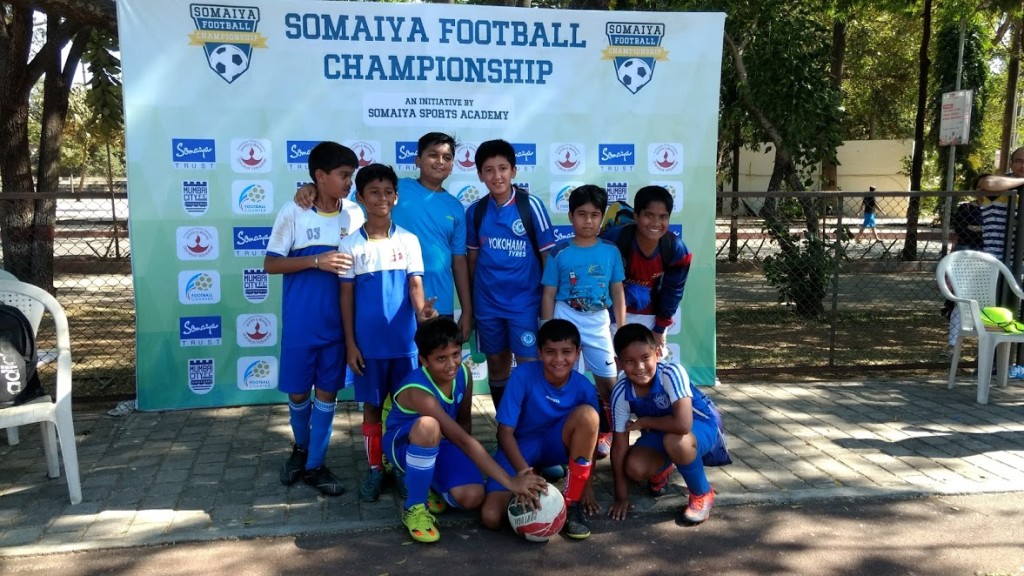“We are here to play, not to bully,” called out the soccer club team owner, as he pulled out Maahir from the Somaiya Soccer Championship game, just minutes after the kick-off. Maahir and one of his team mates, made some disparaging statements to an opposition team player, during play. This was the second game for the afternoon. The first game was comprehensively won, 3-0, by Maahir’s team, Soccer Cubs. An hour later, they lost the second, 0-10.
 Maahir’s Team – The Soccer Cubs, after winning the first game 3-0
Maahir’s Team – The Soccer Cubs, after winning the first game 3-0
Maahir was amongst the best player in his team. In the winning game, he fired the ball like a bullet, from the mid-field, right into the nets. There was little that the goal keeper could do, as he watched the ball sail over his head. An outstanding goal, orchestrated by the coach instructing from the side lines, superbly executed by the player. This proud moment for the parents was soon to be overshadowed by the act of indiscipline. Maahir had to sit out through the second game, even as his team players requested the team owner to get him back on the field.
That afternoon we played the role of parent-coach, Purvi and I had a serious conversation with our 10 year old. It was good to see him quickly understand what he had done wrong. He realized the price his team had to pay for losing one of their best players. One mistake – and he was out of the team.
Sports can be a great teacher, for those who are willing to learn. Exactly a week later, we re-lived and added to the lessons learned on the field, as we watched the Aamir Khan starrer, Dangal. It was easy for the children to pick on the lessons of discipline and hard work (daily 5 a.m. training regime for Geeta and Babita), giving up on what you like (food cravings), being prepared to do whatever it takes (short hair-cut for the girls, non-vegetarian diet), serious and hard preparations (school girls competing against the big boys), fighting back from failure, perseverance, and more. The hard part was for us, the parents, to realize that there was plenty in it for us to learn as well. Every parent needs to play the role of a parent-coach like Mahavir Singh Phogat for his Geeta and Babita,
It is imperative for parents to share with children the importance of setting goals at an early age – so long as children understand their importance and are willing to work towards their realization. Maahir wrote his first goal when he was 5, and Shourya drew it up when he was 2.
A loving parent will always face the dilemma of being a taskmaster coach. That said, it is absolutely, necessary for the parent-coach to enforce strict discipline while maintaining an extremely nurturing atmosphere for the children. As a coach, always demand the best preparation and the maximum effort. But when your child experiences failure, teach him that it is not the end of the world. If he loses, tell him that he was just outscored on the day. Hold him by his hand, talk to him and prepare him for his next challenge. Personally, I have been fortunate and blessed to have parents who’ve always maintained the balance.
A parent-coach should instill the importance of hard work, and repeated practice, in pursuit of excellence. He has to raise the bar every time they enter into the arena. “You have to apply yourself each day to becoming a little better. By applying yourself to the task of becoming a little better each and every day over a period of time, you will become a lot better,” said the famous basket ball coach, John Wooden. In the game that he was pulled out, Maahir had lost his opportunity to become better that day. It is important to teach children to love challenges, be intrigued by mistakes, enjoy effort, and keep on learning
A parent-coach needs to be on the sidelines during the game – to guide, correct, cheer and inspire. It makes a big difference. I recall Maahir telling me after a drawn game that I missed out on, “Papa, if you would had been around, I would have definitely scored a goal and our team would have won.” Likewise, I am happy to have Dad around at the workplace – it has made the difference to my life and career.
And finally, a parent coach should share honest and constructive feedback. As Carlos Dweck writes in her book, Mindset, “Praise should deal, not with the child’s personality attributes, but for their efforts and achievements. Children should be appreciated not for their intelligence and talents, but for the efforts, hard work, practice, persistence, and other growth oriented processes.” Words of encouragement and praise should to be carefully timed and chosen. In the film, the father holds on to golden words “Shabash”, in praise of his daughter until she has won an International Gold Medal.
A parent-coach needs to commit undivided time and attention to the children, because, it’s not about coaching them for a game or a sport, or making them good players. It’s about preparing them for life and making them good human beings.